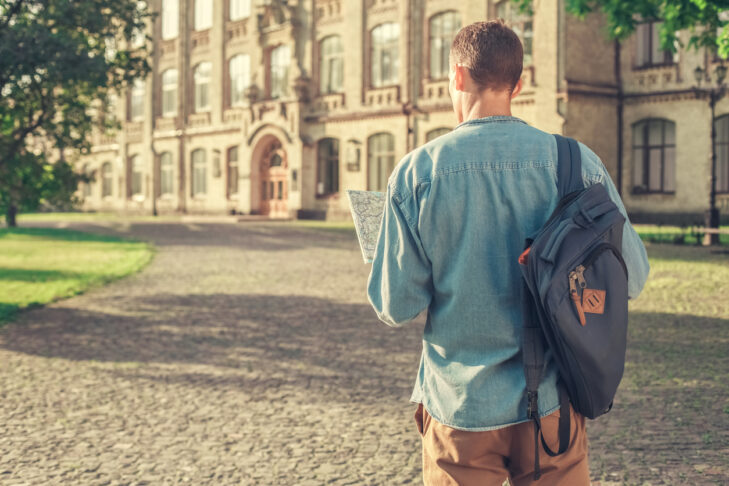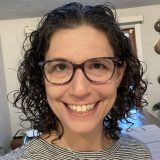To my oldest child, my 18-year-old young man who just submitted college applications, and to my youngest, a 15-year-old high school sophomore: The world is not safe for you.
I have never lived through an earthquake, but I can imagine it: The earth beneath me literally shifts, and as it rocks, everything on earth, living and inanimate, moves in different and unexpected directions.
Trees topple, their jagged roots exposed and crying out for soil they can no longer reach. Bridges collapse, falling in concrete chunks into rivers below, severing the connection from one side to the other. Buildings crumble, entirely or maybe just half. Half a building dangling awkwardly and unsteadily, and the other half in ruins on the ground, a limb cut off, never to be reattached. Roads crack, a lightning bolt in the pavement, severing one side from the other. People frozen on either side of the street, not sure how, or when, they can safely pass to the other side.
When the shaking ends, first responders arrive, first quickly with sirens blaring, but then carefully and cautiously, moving slowly and deliberately through the wreckage. The newly collapsed building is a raw wound: electrical wires are live, the concrete rubble unsteady. Every human desire is there to fix the destruction. But it cannot happen just yet because it’s not safe. First caution tape, then consult the experts: engineers, architects, city planners, fire safety experts, electricians, plumbers, and metal workers. Work as a team to repair and rebuild.
After a long time, a rebuilding takes place. The “after” won’t look the same. For some, the broken bonds are strengthened: a community comes together and rebuilds stronger than what was existing. However, inevitably, the rift is too great. The after may be worse.
Where will we be after this?
As I write this, it is now exactly two weeks since a terror attack on innocent Jewish lives in Israel. A terror attack that caused the death of more Jewish lives in a single day since the Holocaust. A terror attack in which Jews were pulled from their homes, shot and tortured in front of their families, and then left to die. A terror attack in which elderly Holocaust survivors are among the hostages and babies were beheaded. A terror attack timed to take place during the end of the High Holy Days, culminating on Simchat Torah. A terror attack in which entire families were executed. A terror attack in which Israeli medical examiners reported on the horrors and intentional pain inflicted on the victims, details better left unprinted here (trigger warning: click here for more). A terror attack that took place during a musical festival, one that you could very well have been at. The hostages could have been you. At least one hostage is a 23-year-old named Hersch, an Israeli who joined the Dor L’Dor Israel trip with Cohen Camps in 2017, just a few years ago. This could have been you.
My mind races to make sense of this new world, this rubble, this post-earthquake world. I am not alone in asking: Why is this a moment of reckoning for Jewish people?
This is a new antisemitism.
Borrowing from Israeli actress Noa Tishby: it’s antisemitism 2.0. She prophetically nailed this in a Variety magazine guest column published in September 2023: “We can all call out antisemitism on the racist far right, but for various reasons, it’s a lot harder to call out antisemitism on the left. The way it looks on the left is the disproportionate and double standard bashing and manic obsession with the State of Israel. Anti-Zionism is the new, hip, and socially acceptable thing to do, as we can see on social networks such as TikTok, which exploded into frenzied criticisms of Israel, sometimes even in dance routines….”
It was not always this way. For my entire lifetime, “traditional” antisemitism has been denounced in the United States and largely in the world as well. I grew up in the 1980s and 1990s and I was safe as a Jewish person in the United States. I attended Jewish day school and openly practiced Judaism. I read “The Diary of Anne Frank” and “Night” and watched “Escape from Sobibor.” I met Holocaust survivors and heard, read, and studied first-hand accounts of the Holocaust. When I was 15, the Berlin Wall came down and the Cold War was deemed over. In 1993, the year I graduated high school, the United States Holocaust Memorial Museum opened in Washington, D.C. Here is a museum on the National Mall dedicated to showing the world “Never Again.”
As a young adult, I vividly recall thinking, “How fortunate am I to be growing up today in the 1980s and 1990s?” The Holocaust, McCarthyism, the Vietnam War, and now even the Cold War, were in the past. I was safe.
Fast forward to 2002, when your dad and I were buying our first house together and we deliberately sought out Boston-area neighborhoods with Jewish communities and synagogues. We intentionally chose a Jewish overnight camp that celebrated Jewish life and Israeli culture and included a trip to Israel for the incoming 11th graders. Both your dad and I grew up in Jewish communities but also had some experience living in areas where Jewish life was limited (me as a college freshman and sophomore and your dad when first serving in the U.S. Air Force). We knew we wanted a Jewish community. So neither decision—buying a home in a Jewish community and sending you to Jewish overnight camp—was accidental. Our family was safe.
Fast forward, and horrific incidents like the slaughter at the Tree of Life Synagogue in Pittsburgh in 2018 or neo-Nazis marching through Charlottesville in 2017 chanting, “Jews will not replace us,” were swiftly denounced by mainstream Americans across the political spectrum. When actor Mel Gibson or musician Ye spewed antisemitic tropes, it was called out and they even suffered the consequences of such hate speech. Our family was safe.
This is different. This is the earthquake.
Today, following the terror attacks by Hamas, the reaction has been tepid, at best, and largely silent. Numerous colleges and universities either did not respond at all or responded with a “denouncing of all violence” and a generic call for peace. Universities are flooded with anti-Israel student organizations. Colleges are and should be places of free speech, debate, and discussion, but now many campus organizations call for and celebrate violence and the death of Jewish people. In two especially horrific examples, a Stanford University instructor used his classroom to single out Jewish students in a lesson on colonialism, and a Cornell University professor apologized after saying at a rally that he was “exhilarated” by Hamas’s terror attack on Israel.
Missing in action is education.
An Oct. 17, 2023, op-ed in The New York Times by a University of Pennsylvania professor, entitled “The Moral Deficiencies of a Liberal Education,” captures this point and directly faults higher education for failing in this moment, after 34 student organizations at Harvard—the pillar of U.S. higher education—publicly stated they hold the “Israeli regime entirely responsible for all unfolding violence,” while countless other colleges and universities and their students blame Israel alone.
Missing in action is the truth.
Hamas is a terrorist organization and has been labeled as such. Hamas is not in favor of a two-state solution, and has publicly stated they want the destruction of all of Israel and the death of Jewish people. Hamas’s charter calls for the murder of Jewish people. Hamas called for a “Day of Jihad” against Jewish people. Oct. 7, 2023, was a terrorist attack.
Israel is not a colonizer. Israel is not committing a genocide in Gaza, nor does Israel want the destruction of Palestinian people. It never has.
So where do we stand after the rubble? Are you safe? Are we safe?
While you’ve always expressed an interest in a campus with an active Jewish life, now the corollary must be asked: Are you safe? Until this earthquake, “are you safe” meant:
Are you safe: Yes, the campus has a blue-light system to walk you home after dark.
Are you safe: Yes, the campus has safe food prep areas to protect you from your food allergies.
Are you safe: Yes, you understand consent and respect with a sexual partner and your own body autonomy.
Are you safe: Yes, we’ve talked about drugs and alcohol and “always call us if you need a ride,” no questions asked.
Are you safe: Yes, your campus has mental health support and counselors for when school is causing stress.
Now we must ask: Does your campus have anti-Jewish activism and what does that look like? Are you safe? Are you safe from instructors? Are you safe in your dorm room? Are you safe? Can you wear your Star of David? Can you hang a mezuzah on your door? Are you safe?
I confess these words I did not expect to be part of our conversation in choosing your campus.
I am sorry. You are no longer safe. We are no longer safe. I am sorry you now know what antisemitism looks like.
This post has been contributed by a third party. The opinions, facts and any media content are presented solely by the author, and JewishBoston assumes no responsibility for them. Want to add your voice to the conversation? Publish your own post here. MORE



